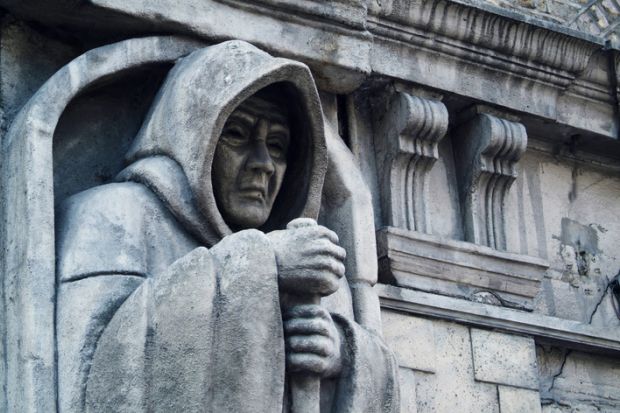It is never easy to look mortality in the face – which perhaps explains why comparatively few academics put death at the heart of their research.
But some, of course, do. A few years ago, I attended “a three-day festival of arts, humanities and new ideas”, funded by the Arts and Humanities Research Council, which presented some striking examples of collaborations between academics and creative businesses.
Among those exhibiting was the University of Bath’s Centre for Death and Society (CDAS), that had created “a pop-up cemetery” where visitors got a chance to suggest epitaphs for themselves. Examples included “She got shit done”; “A plot at last”; and “Here be maggot food”.
Our Outer Limits series, devoted to “academia outside the comfort zone”, has already explored the researchers who work in “body farms”, exposing dead bodies to the elements and charting the process of decomposition (information often crucial for policing and the prosecution of criminals), as well as those who investigate ghosts and other supernatural phenomena.
So it sounded interesting to take a trip to Bath to visit the scholars at CDAS, where researchers’ interests range from organ donation and the international trade in body parts, to bereavement rituals, “funeral poverty” and “how the internet shapes grieving and dying”.
I report on their fascinating if sometimes uncomfortable research in a feature, where I also look at how their colleagues respond to “the death squad” – as they have been called – and the emotional impact that this research can have on both scholars and their students.
I learned a great deal from the people at Bath, but for me the most startling material came from another researcher. Christina Welch, a senior fellow in the department of theology, religion and philosophy at the University of Winchester, works on a range of topics relating to death and the visual arts.
One of them, she told me, was “erotic coffin calendar art”. I have to admit that I’d never heard of this genre, but it turns out to be pretty much what it says on the tin: two coffin manufacturers in Italy and Poland promote their products with calendars featuring near-naked young women, sometimes armed with power drills, sprawled across their coffins.
It seems unlikely they are an effective marketing device when someone is looking for a coffin for their grandmother, but I haven’t seen the sales figures. In any event, we made the editorial decision not to reproduce any of the pictures on the pages of Times Higher Education – and I’m not even going to include a link here.
Death research can rightly claim to address some hugely important issues which many of us shy away from. But it can also take one to some very strange places.
Matthew Reisz is a reporter for Times Higher Education.
Register to continue
Why register?
- Registration is free and only takes a moment
- Once registered, you can read 3 articles a month
- Sign up for our newsletter
Subscribe
Or subscribe for unlimited access to:
- Unlimited access to news, views, insights & reviews
- Digital editions
- Digital access to THE’s university and college rankings analysis
Already registered or a current subscriber? Login






